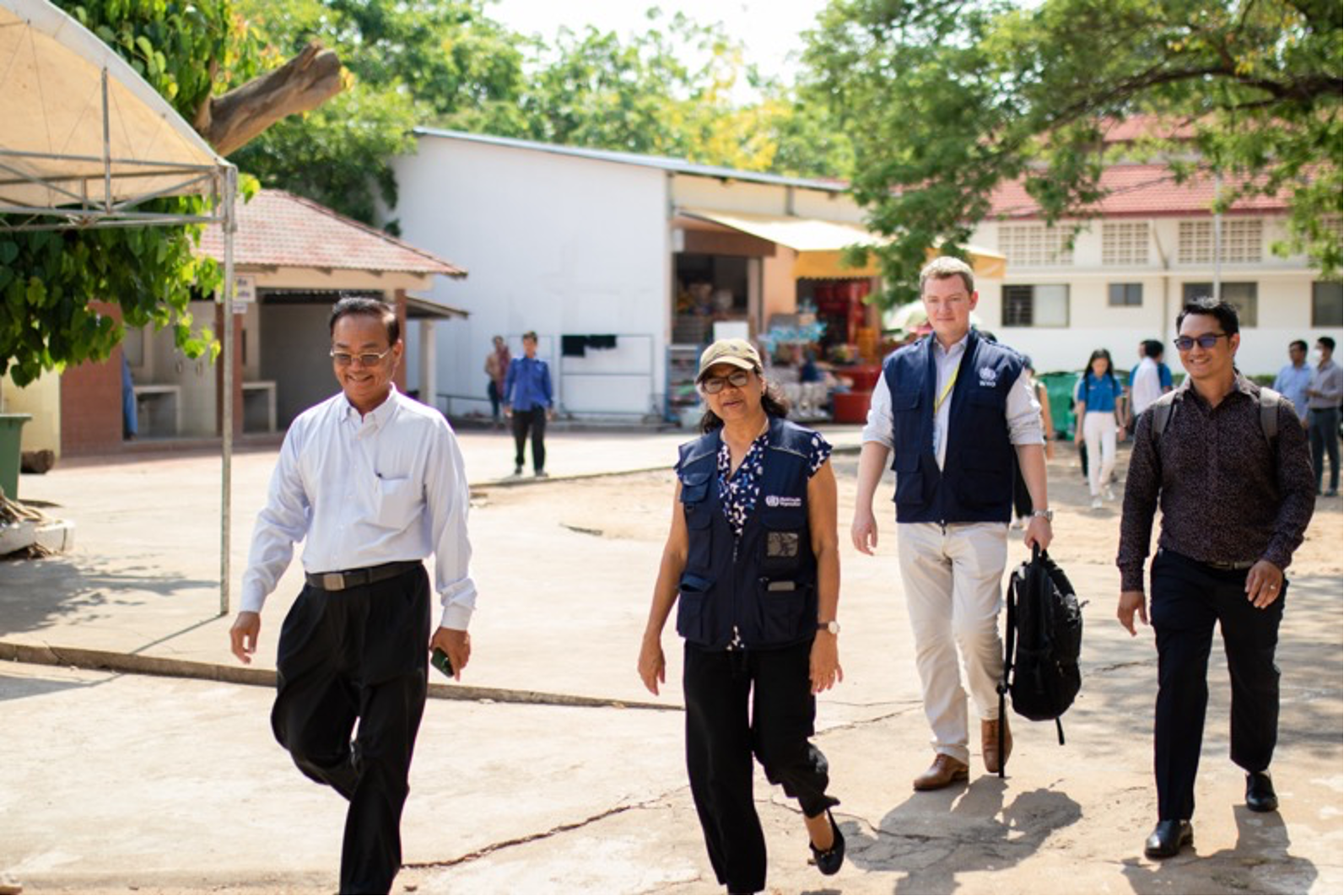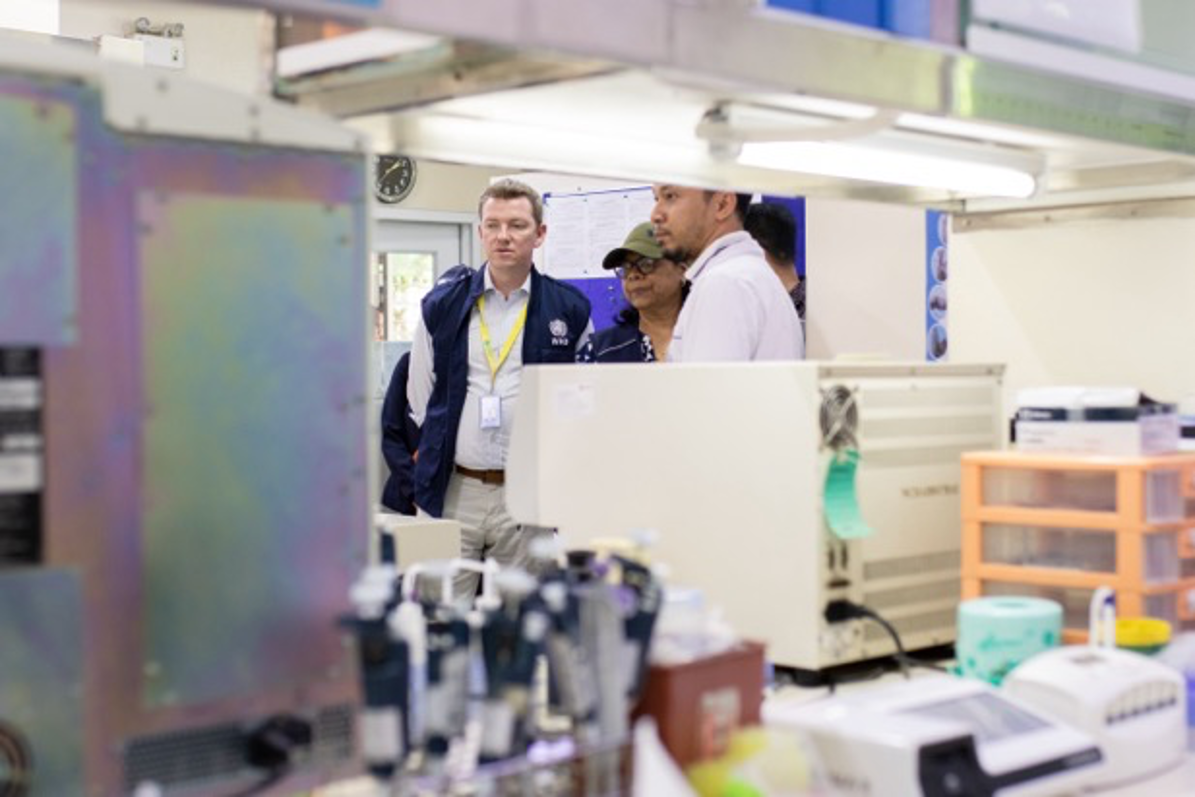/data-and-analytics-(dna)/data-exchange-(dex)/who-presence-in-countries--territories-and-areas.tmb-1920v.jpg?sfvrsn=f1146a2_2)
Comprehensively strengthening Cambodia’s health security
Stronger WHO country presence for a healthier and safer world
Joint Outcome 5.2.
Preparedness, readiness and resilience for health emergencies enhanced
Cambodia faces increasing health risks driven by rapid climate and environmental changes, compounded by recurring public health challenges such as outbreaks of avian influenza, mpox, methanol poisoning and annual flooding. These risks underscore the urgency of strengthening the country’s health security systems. In response, the World Health Organization (WHO) provided comprehensive technical support to help Cambodia enhance its preparedness and response capabilities. Through a collaborative effort, Cambodia conducted its second Joint External Evaluation (JEE) in May 2024, with WHO’s technical support and funding from the United States Agency for International Development. This effort marked significant progress, as 33 of the 56 JEE indicators assessed (59%) were rated at demonstrated or developed capacities, up from 20 of 48 indicators (42%) in the 2016 evaluation. These advancements not only strengthen Cambodia’s ability to prevent, detect and respond to health emergencies, but align with broader global health security objectives and the immediate needs of vulnerable populations.
WHO’s support for Cambodia’s health security journey has been comprehensive and tailored to address the country’s unique challenges. In preparation for the second JEE in 2024, WHO Cambodia worked closely with the Ministry of Health’s Communicable Disease Control Department to adapt the JEE tools to the country’s context. By leveraging lessons learned from the COVID-19 pandemic and insights from the Asia Pacific Health Security Action Framework1., WHO ensured that the evaluation addressed emerging risks and reflected the latest public health advancements.
Additionally, WHO facilitated multisectoral engagement, coordinating efforts among various partners to conduct a comprehensive evaluation across 19 technical areas, including surveillance, national laboratory systems, infection prevention and control, and emergency response management.

Experts from the JEE team engage with provincial hospital officials during a field visit in Kampong Cham Province, Cambodia.
The JEE revealed significant progress, with 59% of the 56 assessed indicators rated at demonstrated or developed capacities, up from 42% in the 2016 evaluation. These improvements are reflected in Cambodia’s enhanced ability to detect and respond to public health emergencies. Surveillance systems were strengthened through better data collection and reporting mechanisms, while emergency response management benefited from upgraded incident management systems. WHO provided essential policy, strategy and technical advice, along with substantial financial support, which enabled the expansion of Cambodia’s national laboratory network from one laboratory to 20 in just three years.
Additionally, infection prevention and control guidelines were updated, and health care workers received training to mitigate risks within health care facilities. From February 2023 to September 2024, Cambodia detected and reported 16 confirmed cases of human infection with avian influenza A (H5N1), triggering a robust One Health response. This response, involving WHO, the Ministries of Health, Environment, and Agriculture, Forestry and Fisheries, and key partners such as the Food and Agriculture Organization, the United States Centers for Disease Control and Prevention, and the Institut Pasteur du Cambodge, resulted in improved surveillance, contact tracing, and community outreach and education efforts.

Despite progress, the JEE identified challenges, such as limited human capital and gaps in sustainable financing for health security. Integrating JEE findings into Cambodia’s National Action Plan for Health Security (NAPHS) for 2025–2026 will ensure long-term sustainability. Aligning the NAPHS with sector-specific plans, developing workforce planning frameworks and securing sustainable funding will enhance resilience. Strengthening communication mechanisms, workforce development and financial sustainability, along with regular cross-sector engagement, will support the updated International Health Regulations and improve accountability. Key lessons underscored the need for continuous evaluation and flexibility in health security strategies.
Cambodia’s progress in strengthening health security demonstrates its commitment to building a more resilient public health system. The second JEE provided a clear roadmap for further strengthening workforce development, sustainable financing and cross-sector collaboration. Integrating JEE findings into the NAPHS will be critical to addressing remaining gaps and ensuring long-term sustainability. WHO will continue to provide targeted technical and policy support, working alongside the Royal Government of Cambodia and key partners. By translating evaluation results into concrete actions, Cambodia can enhance its preparedness and response capabilities, setting a strong foundation for future health security advancements.
